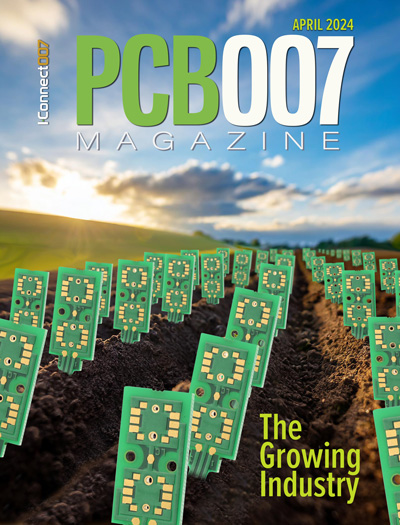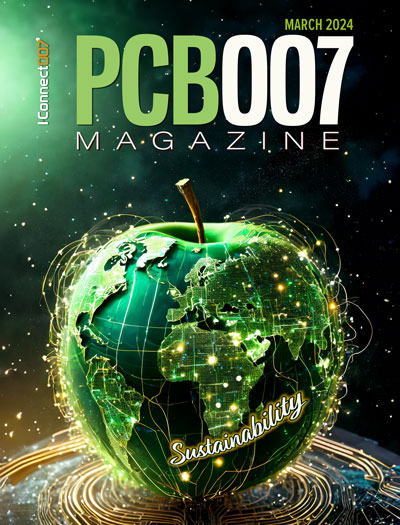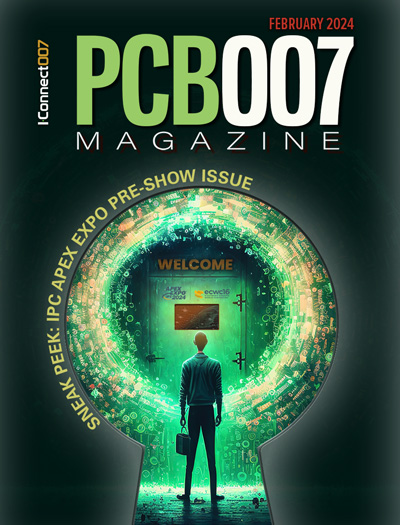-

- News
- Books
Featured Books
- pcb007 Magazine
Latest Issues
Current Issue
The Growing Industry
In this issue of PCB007 Magazine, we talk with leading economic experts, advocacy specialists in Washington, D.C., and PCB company leadership to get a well-rounded picture of what’s happening in the industry today. Don’t miss it.

The Sustainability Issue
Sustainability is one of the most widely used terms in business today, especially for electronics and manufacturing but what does it mean to you? We explore the environmental, business, and economic impacts.

The Fabricator’s Guide to IPC APEX EXPO
This issue previews many of the important events taking place at this year's show and highlights some changes and opportunities. So, buckle up. We are counting down to IPC APEX EXPO 2024.
- Articles
- Columns
Search Console
- Links
- Events
||| MENU - pcb007 Magazine
Viking Test Services: Much More than Test
July 21, 2016 | Pete Starkey, Barry Matties - I-Connect007Estimated reading time: 28 minutes
Recently, 007 Technical Editor Pete Starkey and I toured Viking Test’s facility in Hants, UK where we met Managing Director Jake Kelly to learn about the history of the company, their recent involvement in the Indian PCB market, and what he thought of the EIPC Summer Conference.
Barry Matties: Jake, will you please start by giving some of the history of Viking Test—where you started and how arrived at where you are now?
Jake Kelly: My dad started the business 30–35 years ago. As the name Viking Test Services suggests, we were a testing service for testing bare unpopulated printed circuit boards. We started in a small, approximately 700 square feet unit with a few people doing opens/shorts testing. That's where the business started, using a small electrical tester made by a company called Viking in Scandinavia. At that time, there were probably 500 printed circuit board companies in the UK, and electrical testing was not commonly used.
We started doing a little bit of service for some companies to see if they were getting some opens and shorts on some boards, and so the service became more popular and more commonly used in the industry. That was pretty much just PTH or single-sided conventional boards at the time. Then it got more complex and we started talking about surface mount, and a bit more complex again when we started getting double-sided and having to make double-sided adapters and pin adapters. It was when flying probes came in when the business started to change, because we bought a flying probe machine called MicroCraft from Japan. We were using that as a service; we became very competent at using the machine and repairing the machine, so we started offering the machine for sale.
Matties: That's when you began your sales side of the business?
Kelly: Yeah, that's exactly right. Customers, when they're spending a certain amount of money with us per month on the services, are going to look at bringing that service in-house, not just for the cost but for the logistics point of view and the time point of view.
Matties: What year was that?
Kelly: That was probably between 1998–2000, when the PCB industry was extremely strong. There were a lot of PCB companies in the UK making a lot of money, and selling testers was easy. We were selling, I don't know, 10–15 sets of electrical testers a year, on top of the electrical test services. It was nice.
Matties: You were a really healthy business. Your overhead was low and your revenues were good.
Kelly: Yeah, that's how it was, and then at some stage in the early 2000s was the migration to China. The big shops were going, and the Chinese shops were just taking more and more of the business in the UK. Here we are now in 2016 and we've probably got approximately 50 PCB companies in the UK—small to medium size, no big ones at all. That wasn’t just in the UK—that's what's happened all over Europe. We've adapted an awful lot; our services are almost non-existent now in terms of electrical test services. Everybody in the UK has a tester, we either sold it or somebody else has, but the MicroCraft name is now probably the number one in the UK.
Matties: Back to the heritage of you guys introducing it early on.
Kelly: Yeah, and being able to service and support it, that's been the key. We're not just a guy in a car, or working from a front room office offering equipment for sale where if there's any service or support needed it's going to come from Japan, China or Europe. We're here, we're local, and that's always where we've been focusing to make sure that we can do that right. Because the majority of our sales is second or third machine sales, it's not the first one, so we need to make sure that that service and support are right, which has always been the case. Based on the successful sales of the flying probers, customers really started asking us if we could expand and if we could offer this or that machine, and we weren't offering that; it wasn't in our product portfolio at all.
I remember one customer asking us if we could sell a Silverline, and he wanted to buy a Silverline from us because there was a lot of trust there, and a lot of confidence that it would be right even though we didn't have it. I found him one, actually a European-made one, and we sold it to him, it worked fine and he was very happy with that. At some stage I went to China myself, because there was all of this talk about everybody buying the boards in China and setting up offices there, or European companies buying Chinese businesses and setting up a manufacturing facility in China. So I went to a CPCA show in in about 2004, and I went into these enormous halls and saw all of this equipment and some was bad quality. I thought, well I can't do anything about that, but some was good quality. Good quality and very reasonably priced, and I was thinking that we could work with this.
I didn't go over there looking for a specific product or specific line, but I definitely came away with the feeling that we could work with some of these companies. Coupled with some local knowledge, some local support, some local service and spares, we could work together. That's what we did and haven't looked back since. We've got a good range of suppliers now, and Universal (UCE) looks after our process lines, an absolutely fantastic company. They're the biggest manufacturer of wet process in the world.
Matties: And often copied, I’ve noticed.
Kelly: Oh yeah, there are a lot of copycats over there. That's good, and they're proud of that, because if you're going to copy someone, you're going to copy a good one and not a rubbish one, right?
There are copycats out there but it's never as good, it's always one or two years behind in the technology. UCE manufactures something like a kilometer of wet process equipment every month, and they come up with something like 2500–3000 people all together. Out of those people there's a couple hundred in R&D alone. Although they're making a lot of equipment, their primary focus is still on quality and technology. They’re a brilliant partner for us.
Page 1 of 5
Suggested Items
Cicor Records Solid Growth in Q1
04/16/2024 | CicorThe Cicor Group continued to grow in the first three months of the year. Quarterly sales increased by 11.8% to CHF 107.3 million compared to the first quarter of the previous year (Q1/2023: CHF 96.0 million).
TT Electronics Awarded Contract with Kongsberg Defence and Aerospace
04/11/2024 | TT ElectronicsTT Electronics, a leading provider of global manufacturing solutions and engineered technologies, announced today that its Fairford UK business has been awarded a new contract with long-standing customer Kongsberg Defence and Aerospace (Kongsberg) for the production of complex cable harness solutions.
Cicor Successfully Completes Acquisition of TT Electronics IoT Solutions Ltd.
04/03/2024 | CicorThe Cicor Group has successfully completed the acquisition of TT Electronics IoT Solutions Ltd. with three production sites in the UK and China.
Absolute EMS Successfully Recertifies ISO 9001:2015 and AS9100 Standards
03/26/2024 | Absolute EMS, Inc.Absolute EMS, Inc., an award-winning EMS provider of turnkey contract manufacturing services, is proud to announce the successful recertification of its ISO 9001:2015 and AS9100 Rev D SAE International Aerospace Standards.
Arlon EMC Receives IPC-4101 QPL Recertification
03/20/2024 | Arlon Electronic MaterialsArlon Electronic Materials has successfully completed an intensive two-day recertification audit by IPC Validation Services that examined Arlon’s manufacturing processes and testing procedures to assure that they are in conformance to the requirements of IPC-4101E-WAM1, the Specification for Base Materials for Rigid and Multilayer Printed Boards.


